On August 23, at the University of Education, Hue University, a national workshop on "Current situation and solutions for implementing the General Education Program (GDPT) at the primary level" took place, aiming to evaluate the effectiveness of the program at the primary level.
The event attracted many education experts, aiming to provide optimal solutions for the application of the 2018 General Education Program. The workshop was not only an opportunity for discussion, but also a foundation for reforming primary education nationwide. Professor Nguyen Minh Thuyet, Editor-in-Chief of the 2018 General Education Program, presented a report pointing out the program's successes and limitations after its implementation.
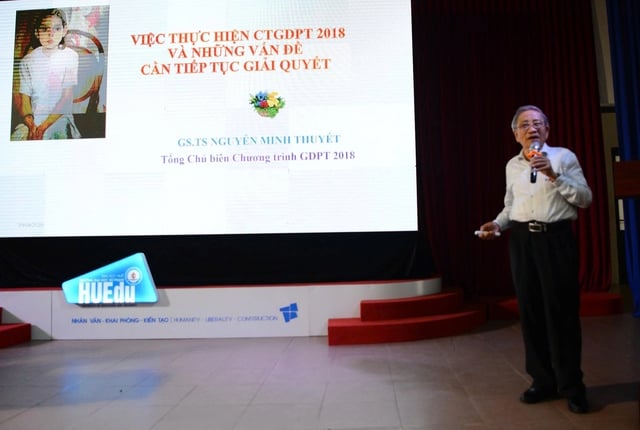
Professor Nguyen Minh Thuyet, Editor-in-Chief of the 2018 General Education Program, presented a report at the conference.
PHOTO: HUY LE
The workshop attracted more than 200 researchers, teachers, department and school management staff; postgraduate students and students from more than 80 educational and training institutions; publishers and research institutes with 88 scientific reports on research, measurements and proposed solutions for the program.
Initial successes and limitations of the 2018 General Education Program
At the workshop, Professor Nguyen Minh Thuyet gave a more than 2-hour report on the initial successes and limitations of the program.
According to Professor Nguyen Minh Thuyet, the 2018 General Education Program has only had the first batch of students completing the entire program after 5 years of implementation, but it is also necessary to look back at what has been done and what needs to continue to be solved for successful innovation.
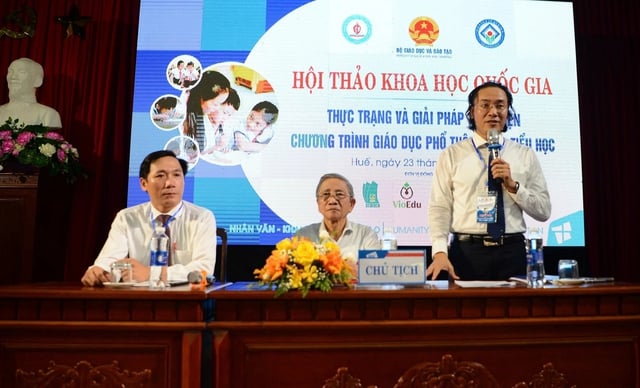
The moderators presided over the workshop.
PHOTO: HUY LE
Regarding the assessment of success, Professor Nguyen Minh Thuyet said that "The first success is that the overall program and the program of all subjects and educational activities (hereinafter referred to as subjects) have been realized into 3 sets of textbooks (SGK) including full books of subjects and many other textbooks for some subjects (English textbooks of many publishers). Although according to the provisions of law (Resolution No. 88/2014 of the National Assembly and the Law on Education), today, the role of textbooks has changed, but the program being realized into textbooks, especially in the context of implementing Resolution No. 88/2014 "each subject has many textbooks" while ensuring consistency with the program is a very remarkable success.
The second, very fundamental success is that educational administrators, teachers and students have implemented the program well.
"For the first time in the history of education in our country, at least since 1976, education managers and teachers have begun to pay attention to studying the program to teach the correct program, gradually overcoming the habit of directing and teaching completely limited within the framework of a textbook. Thanks to the efforts and creativity of the team of education managers, teachers and students nationwide, the quality of education is gradually improving, meeting the requirements of Resolution No. 29/2013, Resolution No. 88/2014, the Education Law as well as of life, which is to comprehensively develop the qualities and abilities of learners," Professor Nguyen Minh Thuyet assessed.
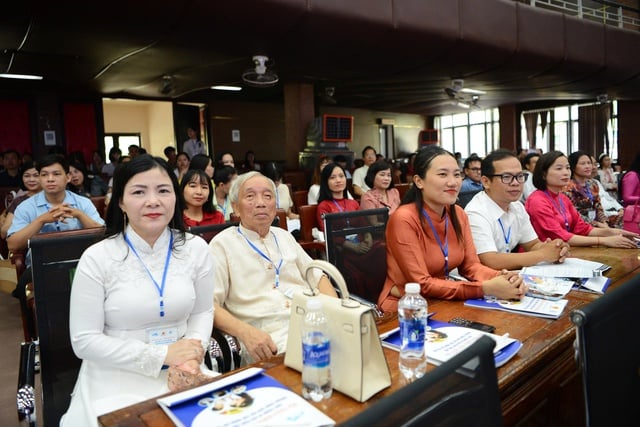
Delegates attending the workshop
PHOTO: HUY LE
According to him, the recent national high school graduation exam in 2025 is a testament to the initial results of the program implementation. Taking the literature exam as an example: Unlike the previous exam, in which the test materials were only in the texts that had been learned in textbooks, even within the "limited program" scope, this time, the material to assess students' reading comprehension ability was a completely excerpt that had not been learned in any textbook. The results of the exam in literature and other subjects in general, shown in the rate of students meeting graduation requirements and the differentiation of the score distribution, showed that the majority of high school students studying according to the new program and new textbooks met the program's requirements for developing qualities and abilities.
According to Professor Nguyen Minh Thuyet, the reasons for the above successes are the correct policies and measures on general education reform proposed in documents of the Central Government, the National Assembly and the Government, along with the close and effective implementation direction of the Ministry of Education and Training.
The 2018 General Education Program is not only highly appreciated by domestic public opinion but also receives positive reviews from international education experts from the World Bank and many other experts.
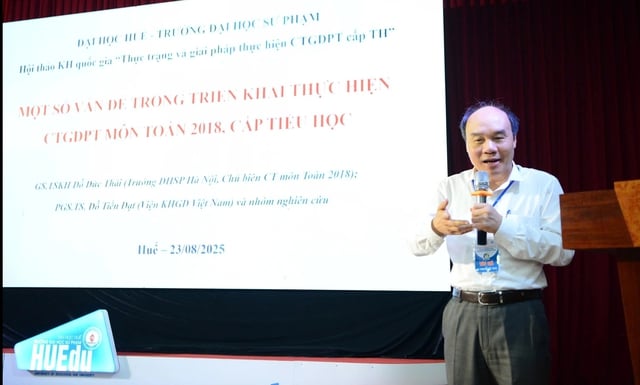
Professor, Dr. Do Duc Thai, editor-in-chief of the 2018 General Education Program's mathematics subject, delivered a speech.
PHOTO: HUY LE
"Vietnam's new general education program for the 2018-2025 period has set a clear goal of transforming the entire general education system from a content-based approach to a competency-based approach, from teacher-centered to student-centered, towards teaching and learning based on technology and skills. These significant changes not only benefit future generations but also contribute to the country's long-term economic development," New Zealand scholar Lance King assessed.
The third, very important reason for success is the efforts and creativity of managers, teachers and students nationwide in implementing the innovation of the program and textbooks according to the Party's resolutions and the State's legal documents. Thanks to the efforts of the whole sector, the new program has come into life, contributing to improving the quality of education, meeting the requirements of industrialization, modernization and international integration.
Limitations of the 2018 General Education Program
According to Professor Nguyen Minh Thuyet, the first limitation of textbooks is the constant change of some policies that have been determined in legal documents that have come into effect. For example, right before the implementation of the program at the high school level, under the direction of the competent authority, the program had to change history from a subject chosen according to career orientation to a compulsory subject, reducing the number of elective subjects. This created an imbalance in the combination of career-oriented subjects, which was not suitable for the career-oriented education requirements of the level of education, especially not suitable for the career-oriented goals and content of this subject in high school (not teaching general history but teaching by topic).
Resolution 88/2014 of the National Assembly stipulates: "Implementing the socialization of textbook compilation; there are a number of textbooks for each subject... General education institutions select textbooks for use based on the opinions of teachers, students and parents according to the guidance of the Ministry of Education and Training". However, Circular No. 25/2020 of the Ministry of Education and Training gives the right to decide on selection to the Provincial People's Committee based on the vote of a textbook selection council for each subject. Circular No. 27/2023 recently removed the regulation on organizing a textbook selection council, but the decision-making power still belongs to the Provincial People's Committee.
"The decision to select textbooks at the provincial level may facilitate the direction of management staff. However, that reflects the old way of thinking about teaching and learning management: managing according to a set of textbooks, not managing according to the program," Professor Nguyen Minh Thuyet pointed out.
"Limiting the use of a unified textbook, whether at the provincial level or at an educational institution, is essentially still implementing "one program, one textbook", which will turn the monopoly of a previous set of textbooks into the monopoly of existing textbooks, eliminating the possibility of new textbooks appearing in the future that are compiled by organizations and individuals, including teachers, to update the reality of life and the development of science, suitable for the new stage", Professor Nguyen Minh Thuyet pointed out the inadequacies.
According to Professor Nguyen Minh Thuyet, Resolution 88/2014 stipulates: "Encourage organizations and individuals to compile textbooks based on the general education program", does not stipulate that the State controls textbook prices, but by 2023, after a number of businesses have mobilized capital and borrowed capital to make textbooks, the revised Price Law stipulates that textbooks are on the list of goods with maximum prices set by the State. In the context of prices of materials, labor and all items increasing from 20% to 40%, textbook prices alone are reduced by 20% - 25%, which is really causing difficulties for businesses.
Resolution 88/2014 stipulates: "The Government shall promulgate a mechanism to ensure fairness in the compilation and use of textbooks". However, up to now, after 11 years, there is still no document stipulating such a mechanism, causing the state budget to continue to spend a large amount of money on state-owned enterprises making textbooks (on average, 400 billion VND/set of textbooks), while socialized textbook enterprises must continue to struggle to overcome all challenges.
"Recently, a committee of the National Assembly has advocated for a return to the policy of 'one program, one set of unified textbooks nationwide', even proposing 'free provision of textbooks to students by 2030'. Perhaps this proposal has not fully studied the policy and practice of applying 'one program, many textbooks' in the world and in Vietnam itself before the education reform in 1956 and in South Vietnam before 1975," said Professor Nguyen Minh Thuyet.
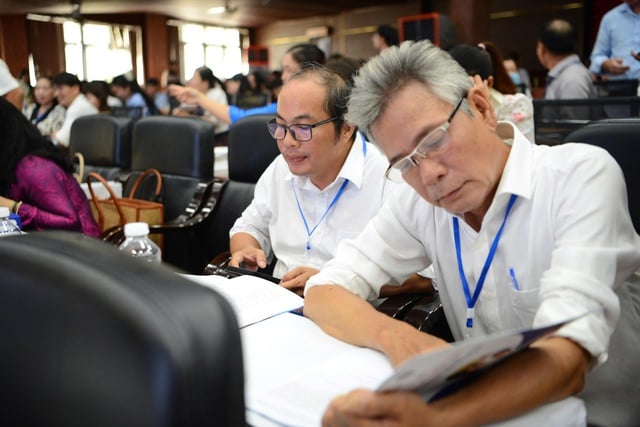
Delegates attending the workshop
PHOTO: HUY LE
In addition, there are limitations in resources that are not guaranteed to implement the program. Some legal documents and directives of the Ministry of Education and Training on assessing educational outcomes are not consistent with each other and with the program; teaching and learning in many educational institutions are not consistent with the spirit and text of the program.
According to Professor Nguyen Minh Thiet, the 2018 General Education Program stipulates: "Developing the general education program is a regular activity, including the stages of evaluating, amending, supplementing, and perfecting the program during the implementation process...". Therefore, in the future, the program needs to be adjusted and supplemented to suit the actual situation and new documents of the Party, the State, documents on the program and educational science in each development period. It is necessary to overcome the overload situation and create conditions for students to have more time to play, entertain, participate in sports and cultural activities...; specify the requirements to achieve in terms of qualities and abilities...; develop educational programs for specialized subjects; adjust local educational content; ensure initiative in building school plans; unify the program and documents on evaluating educational outcomes; create favorable conditions for implementing the program.
Source: https://thanhnien.vn/gs-nguyen-minh-thuyet-chi-ra-thanh-cong-va-han-che-cua-chuong-trinh-gdpt-2018-185250823153112767.htm





![[Photo] Prime Minister Pham Minh Chinh receives President of Cuba's Latin American News Agency](/_next/image?url=https%3A%2F%2Fvphoto.vietnam.vn%2Fthumb%2F1200x675%2Fvietnam%2Fresource%2FIMAGE%2F2025%2F12%2F01%2F1764569497815_dsc-2890-jpg.webp&w=3840&q=75)

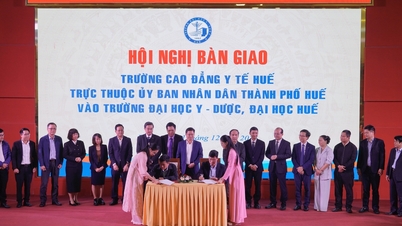


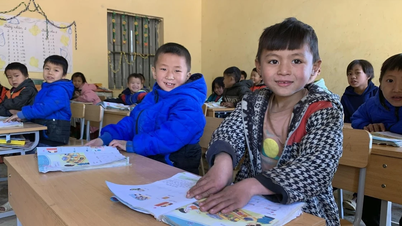
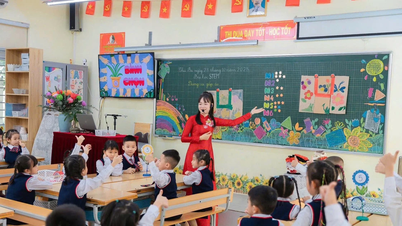
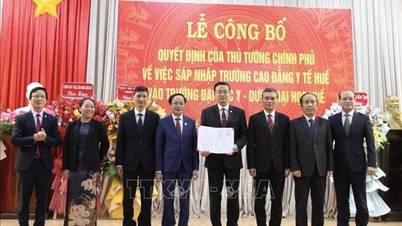





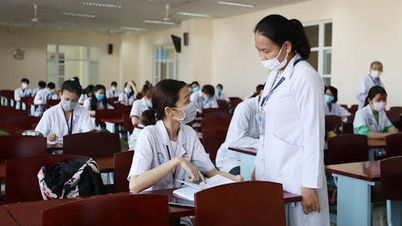
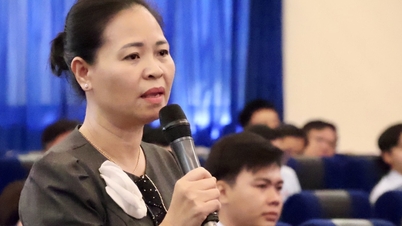
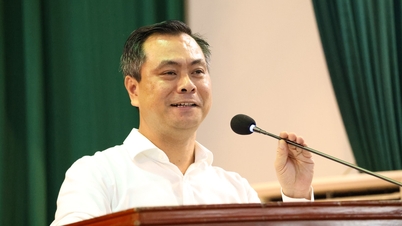
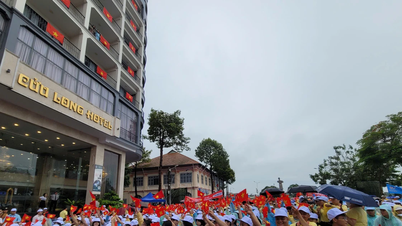
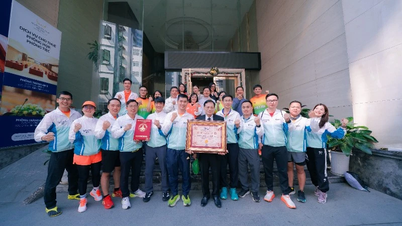





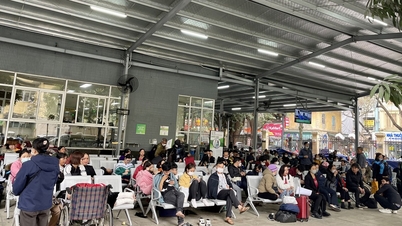
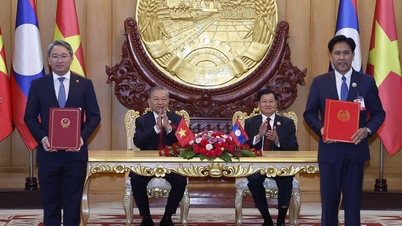

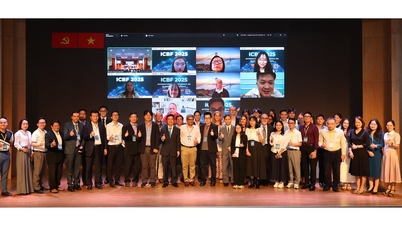












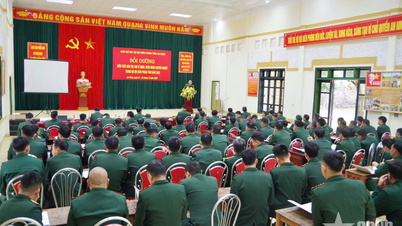



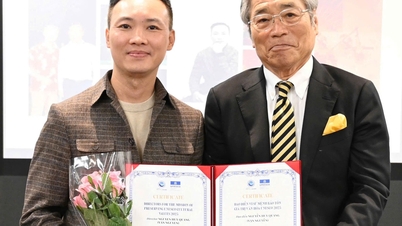





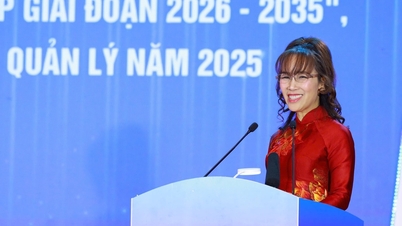





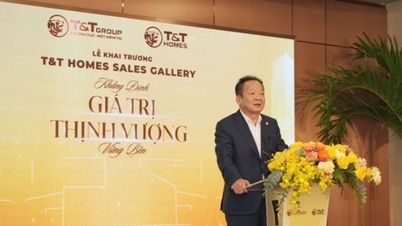


















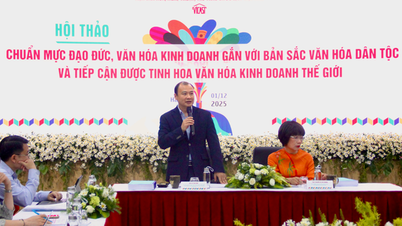
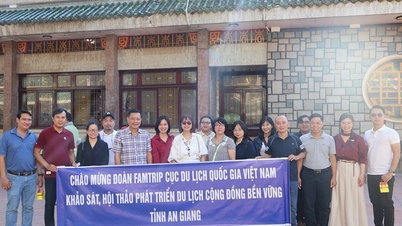

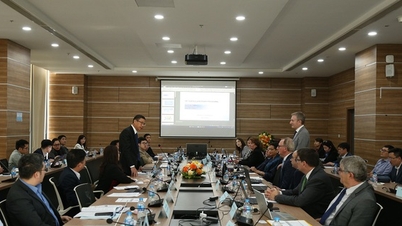







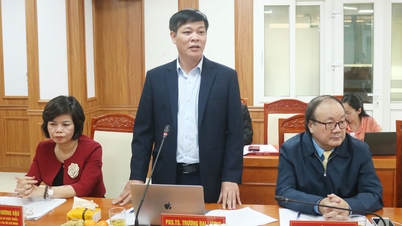

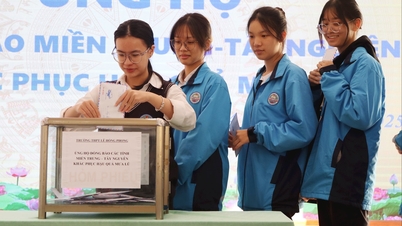














Comment (0)